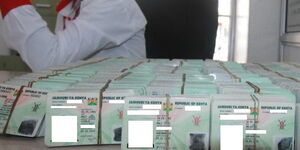President William Ruto’s administration has renewed its agreement with three Gulf companies to continue importing fuel on credit for the next two years under the Government-to-Government (G-to-G) oil deal.
According to Bloomberg, the Energy and Petroleum Regulatory Authority (EPRA) Director General, Daniel Kiptoo, said that the three companies would continue supplying petrol, diesel, kerosene, and jet fuel under a 180-day credit plan.
However, Kiptoo disclosed that Kenya would activate the agreement toward the end of the year once the country completes importing the remaining oil consignment secured under the previous agreement.
He clarified that the delay in shipping the remaining oil consignment into the country was due to Uganda's decision to source its fuel directly after abandoning its previous deal with Kenya.
While expressing approval of the deal, the EPRA boss noted that the importation of oil under the G-to-G agreement helped stabilise the shilling against major global currencies, including the United States dollar.
Since its launch, the local currency has appreciated by 17 per cent, according to data from the Central Bank fo Kenya (CBK), with the local unit currently trading at an average of Ksh129 against the greenback.
"The plan has helped stabilize the currency. It also gives us security of supply, even in the event of supply shocks. The structure is working, and even other countries are coming to Kenya to replicate it," Kiptoo said.
"Freight and premium costs will drop by 11 percent to Ksh10,068.24 per metric ton of diesel, 7 percent to Ksh10,842.72 for gasoline, and 13 percent to Ksh12,520.76 for jet fuel. Prices for the products are based on the S&P Global Platts benchmark," he added.
Kiptoo further emphasized that the G-to-G oil deal had significantly helped local companies that import petroleum, as they no longer needed to use scarce foreign currency when purchasing oil on the international market.
While Kenya previously exported its fuel products to Uganda, the country now also exports fuel to other landlocked nations such as the Democratic Republic of Congo (DRC), Rwanda, South Sudan, and Burundi.
This is the second time Kenya is renewing the oil deal with the three companies as part of the government’s strategy to stabilize the macroeconomic environment.
The deal, first launched in April 2023, marked a switch from the previous open tender system in which local companies bid to import oil every month.












